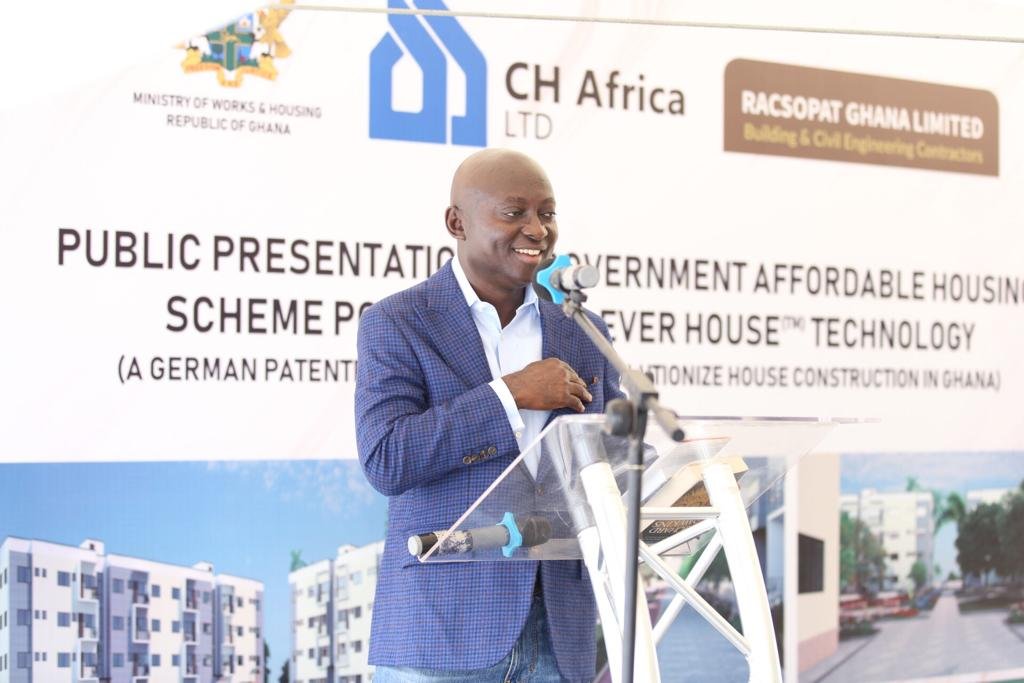Government has entered into an agreement with two firms – CH Africa and Rascopat Ghana – to build 100, 000 houses across Ghana.
The move is aimed at reducing the country’s housing deficit which currently stands at two million units.
The houses will be built under the Clever HouseTM housing and construction technology which ensures the construction of a complete house in less than 10 days.
Works and Housing Minister Samuel Atta Akyea said engineers at the Ministry have certified the integrity of the buildings under the project.
Speaking at a ceremony to outdoor the Clever House and Construction Technology, Mr. Atta-Akyea said this move and others which are ongoing will ensure the housing challenge in the country is tackled head on. He believes this is the surest way of sustainable economic growth.
The Technology
The Clever HouseTM housing and construction technology is a German engineering designed to fix the huge global housing deficit and to meet the demand for affordable high quality housing.
It is the smartest innovation in housing and construction engineering since the beginning of time. The technology is invented, approved and certified in Germany for its superiority to the traditional housing construction technologies in terms of strength and durability, quality, resistance to weather conditions, sound and earthquake resistance.
Some of the engineering values of the Clever HouseTM technology include:
▪ Light Weight load bearing of 67.8 kg per m2 for 94 mm wall.
▪ Seismic rating is 8.0 and can be increased to 9.0.
▪ Wind resistance 180 kph and can be increased to 200kph+.
▪ Handles heavy snow loadings up to 8.2 kN/m2.
▪ Thermal conductivity: 0.1035 W/m2K
▪ Excellent Insulation: 0.869 m2K/W – R value of 13 with 94mm thickness panel
▪ Fire Proof:- Incombustible with the highest fire rating: A1
▪ Wall shock resistance of 500 KG concentrated force
▪ Water and Moisture-Proof
▪ Sound Proof up to -40db
▪ Electricals and Plumbing embedded within the wall panels
▪ Interior micro-climatic condition of 20o – 25o (consistent internal room temperature)
▪ Natural disaster-proof and perfect for locations of extreme geological and meteorological challenges – extreme temperature, earthquake zones, hurricane or cyclone zones.
It is currently the world’s leading technology for building/construction of housing units, with certifications from the EU, UK US, Australia, China, India, Malaysia, South Africa, and over 30 other countries.
Clever HouseTM and their global partners have over 30 Government projects in various countries across the globe including Australia, China, India, Malaysia and Russia.
The Clever HouseTM technology is now in Ghana to revolutionize the way we build houses and help us fix our housing deficit of estimated 1.7 million (plus) within the shortest possible period. It is also expected to slash down the capital requirement to fix the housing deficit by up to 40%. This essentially means that individuals or prospective house owners can reduce their house construction budget by 40% if they keyed into the Clever House technology.
Key advantages of the Clever HouseTM technology include:
• Reduction in construction time and labour cost by up to 80%;
• Reduction in material cost by 60% making it possible to build and supply high quality modern houses at rock-bottom prices to both governments and the general public.
• The speed of construction means that, for example, a 52m2 mainframe can be delivered in 2.5 hours (exclusive of foundation, fittings and fixtures); 10 hours to complete ready-to-occupy 52m2 two-bedroom-house (exclusive of foundation).
This makes the Clever HouseTM construction technology the ultimate engineering for resolving our housing deficit challenges.
The sample house (located adjacent the Achimota Police quarters) was a three weeks technology transfer training project – to give a group of local engineers and technicians a hands-on experience of the technology.

Job creation
Excitingly, to execute the contract for the 100,000 (One Hundred Thousand) housing units, CH Africa will commence the rolling out of 10 (Ten) factories across the country to manufacture all the components locally. The project is estimated to create 100,000 (One Hundred Thousand) jobs for Ghanaians.
Source: Ghana/Starrfm.com.gh/103.5FM/Osei Owusu Amankwaah




